Published on
First came love. Then came marriage. Then came the pharmacy for these Northeastern graduates
Ken and Christina Procaccianti met on the Green Line while attending Northeastern. Years later — inspired by the entrepreneurial spirit on campus — they launched Green Line Apothecary, now serving all of Rhode Island.
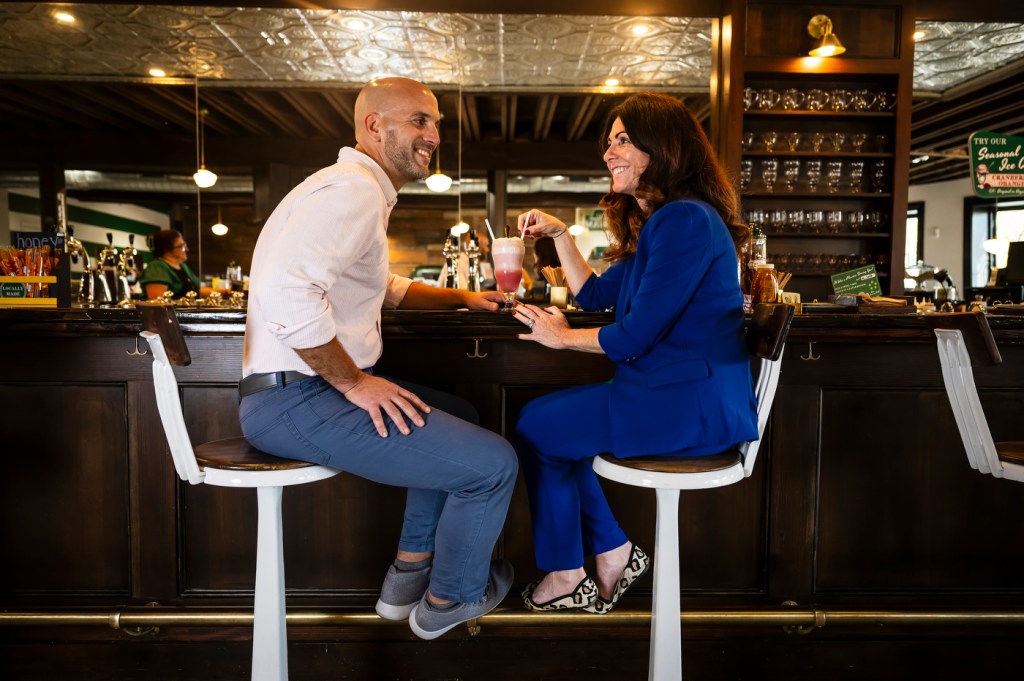
One icy winter night in 2004, Christina Passalacqua, a third-year pharmacy student at Northeastern University, hopped on a packed E train on Boston’s Green Line with her roommate to run an errand. “I was wearing brown snow boots, and I had a black bag,” she remembers. “It’s super crowded; I’m standing in some stranger’s armpit. And my roommate starts on my case, saying ‘I can’t believe you left the house with that bag and shoe combination.’”
The armpit belonged to Ken Procaccianti, who was a few years ahead of Christina at Northeastern studying international affairs and philosophy. Hearing the exchange, he chimed in: “Well, I think you’re pretty, even if you don’t match.”
A few years later, he proposed on the same train line, in front of friends and family who had hidden themselves behind newspapers at the subway platform. They were married in 2008. And though the couple soon moved to Wakefield, Rhode Island —about two hours away from Northeastern —to start a family, they weren’t finished with that E train.
Ken and Christina Procaccianti are founders and co-CEOs of Green Line Apothecary, an independent pharmacy and vintage soda shop with two locations and a statewide delivery service in Rhode Island. Opened in 2016 in a small Wakefield storefront with a staff of four, the company has grown to over 100 employees in Wakefield and Providence, including a fleet of pharmacists, a food and beverage coordinator, soda jerks dressed in green-and-white-striped uniforms, and a few dozen delivery drivers.

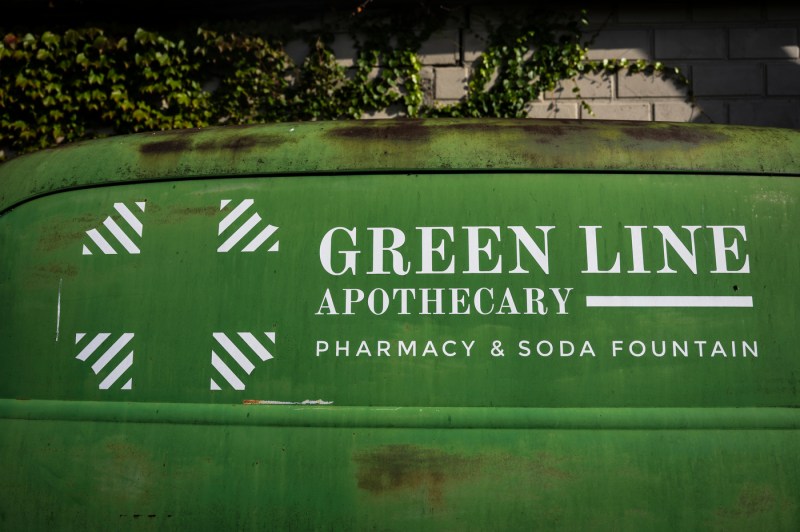
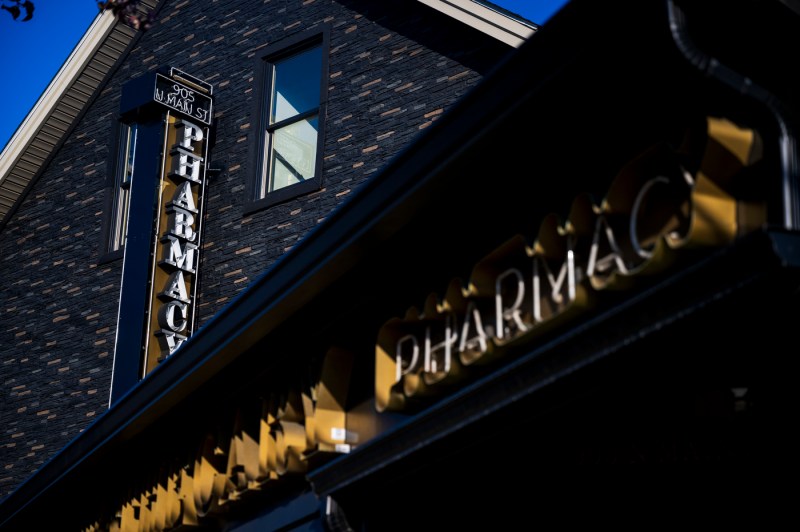
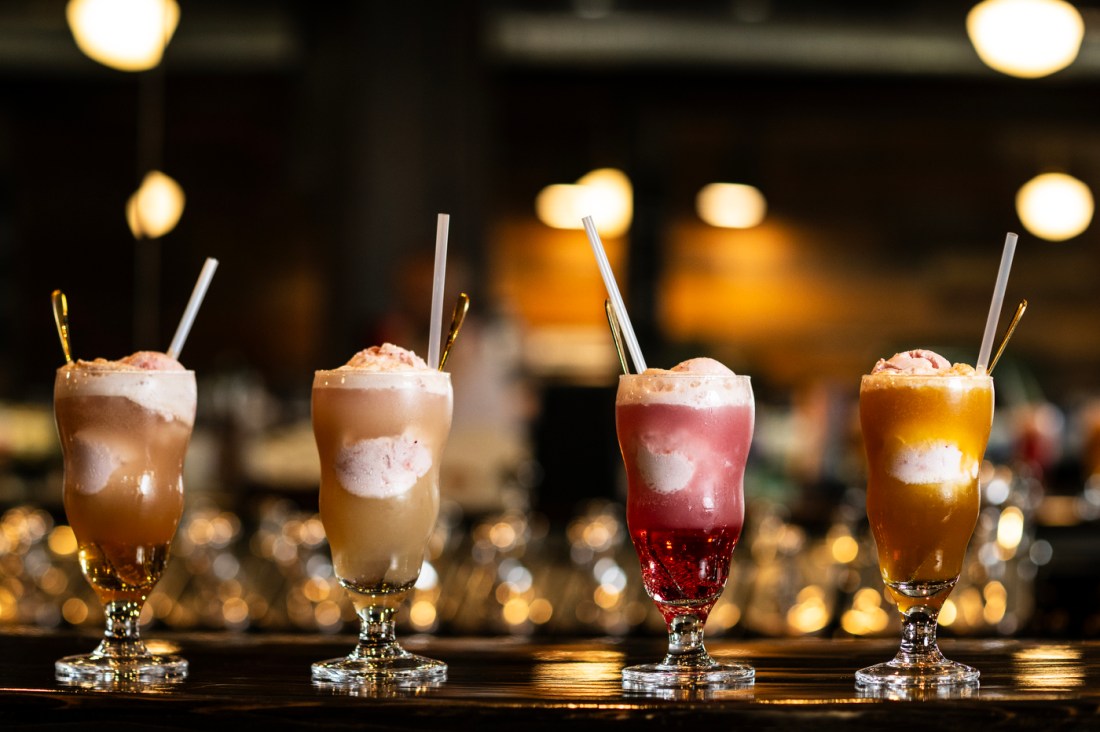
The Wakefield flagship store is in a 4,000-square-foot former auto repair shop perched at the end of the town’s main street, just down the street from the original location. The exterior is painted black with tall gold lettering, visible from several stoplights away. A classic Chevy with a green and white paint job sits out front. Inside, penny candy machines outfitted in Green Line’s signature distressed wood, gold and green colors dot the entryway. To the left, you can get a root beer float; to the right, a flu shot.
It’s a little disorienting if you’re operating under the conventional assumption that independent pharmacies died out decades ago with the rise of the big box retail chains. Indeed, Green Line Apothecary’s very existence in this economy can seem like an act of hubris — particularly in Rhode Island, where CVS has its corporate headquarters in nearby Woonsocket. “CVS is to pharmacy like Kleenex is to tissues here,” Ken acknowledges. “For younger generations, the idea of independent pharmacy doesn’t even exist.”
We’re not going to beat CVS. We’re playing a different game.
Christina Procaccianti, co-founder of Green Line Apothecary
But Green Line Apothecary and other independent pharmacies — a small but remarkably stable segment of the market in recent years — are persisting by carving out a standalone niche in the modern health care industry. They can’t compete directly with the CVS/Walgreens business model. But they can fill in its gaps, which, according to experts, include care for patients with complicated medication needs and service to parts of the U.S. on either end of the population spectrum (very rural, or very dense).
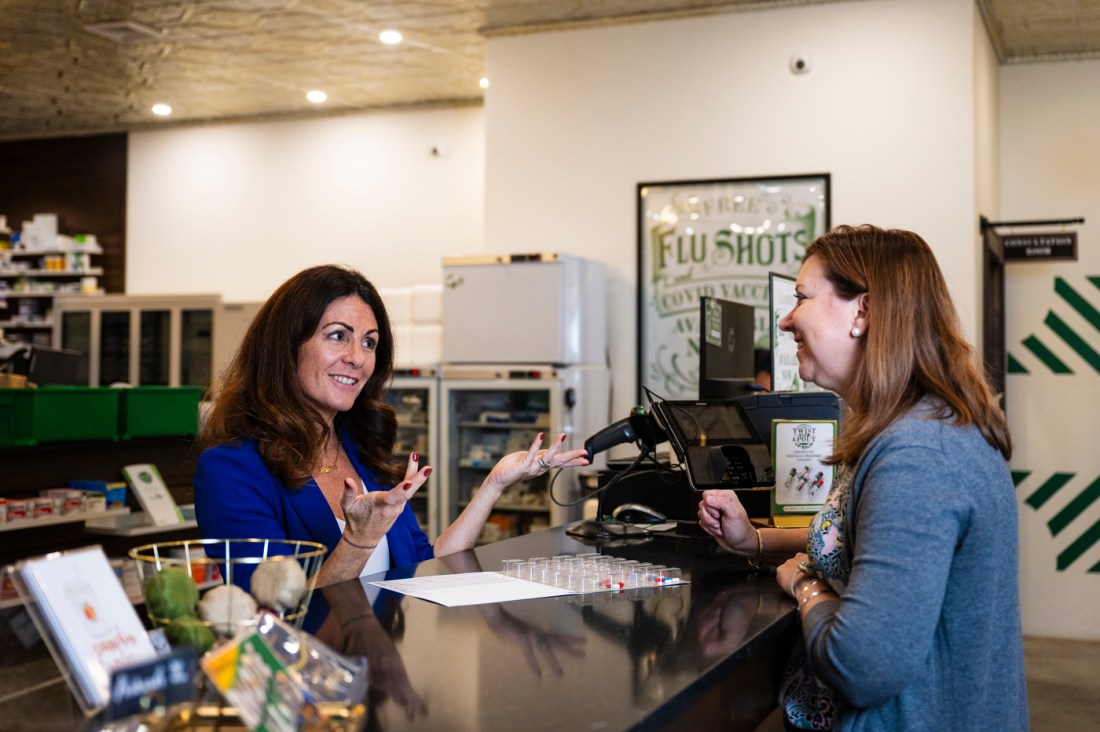
Both are areas of growth for Green Line Apothecary, which has an online retail store and a delivery infrastructure that ships medications everywhere in the Ocean State. The fastest-growing division of the business is Green Line Supply, a prescription management service popular with aging customers in and out of medical care facilities, as well as family caregivers trying to help them remain in their homes.
“If you approach it like you’re trying to be CVS-lite, it won’t work,” Christina says. “We’re not going to beat CVS. We’re playing a different game.”
‘It felt like home’
Christina grew up in southern New Jersey, the eldest of five children raised by a single father. Her dad was a greeting card salesman for Hallmark, and she would drive around the state with him as he hawked his wares. His sales territory was community pharmacies. “I sort of grew up in that environment, and when I made my way to the back of the store it felt like home. Like this is what I’m supposed to do.”
At Northeastern in the early 2000s, she walked onto the track team as a middle-distance runner and worked six straight years through pharmacy school. Ken, a Rhode Island native and the son of a bread delivery truck driver, was also a walk-on athlete (a soccer goalie) and took classes with Michael Dukakis whenever he could. At 23, he ran unsuccessfully for state office, and, after a few years in government, worked in advertising.
Even in their vastly different fields of study, both were influenced by the entrepreneurial atmosphere around campus. “There’s this mentality that you develop as a student at Northeastern that, if I try hard enough, and I care enough, I can make it happen,” Ken says. “You see people setting up shop and going for it all over, and I think that took hold of both of us. When we decided to open our own business, we weren’t deterred by the fear of putting ourselves out there.”
It was an environment that encouraged even the most far-fetched-seeming plans. When Ken decided to challenge then-speaker of the Massachusetts House of Representatives Sal DiMasi, a decades-long institution in state politics, for his seat in 2006, Dukakis was a valuable sounding board.
“I sat down in his office and told him that I was running,” Ken says. “A lot of people [might] say, ‘You’re crazy. You’re a kid,’ but he didn’t. He gave me great concrete advice about how to run a campaign and told me to get a good pair of walking shoes.”
Christina, who says college was far from easy for her, thrived in the supportive environment of the pharmacy school, nurtured by professors including Michael Gonyeau and Jenny Van Amburgh. She found a mentor in Anita Young, a recently-retired instructor in the department’s office of experiential education.
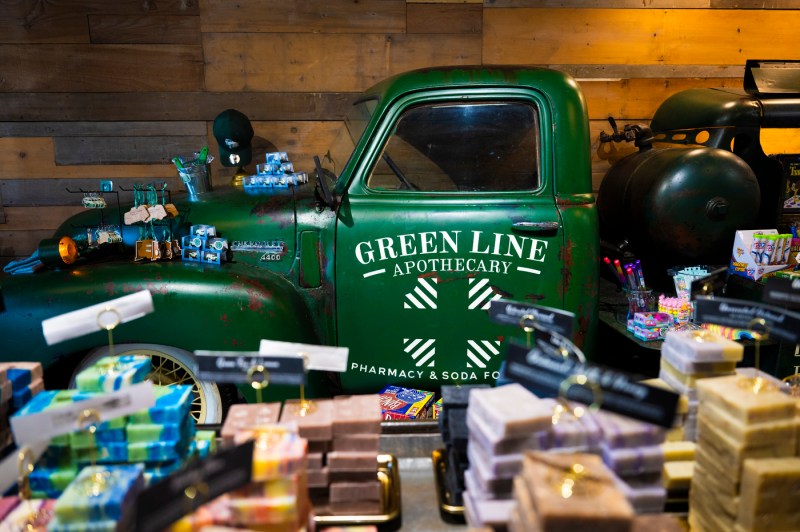
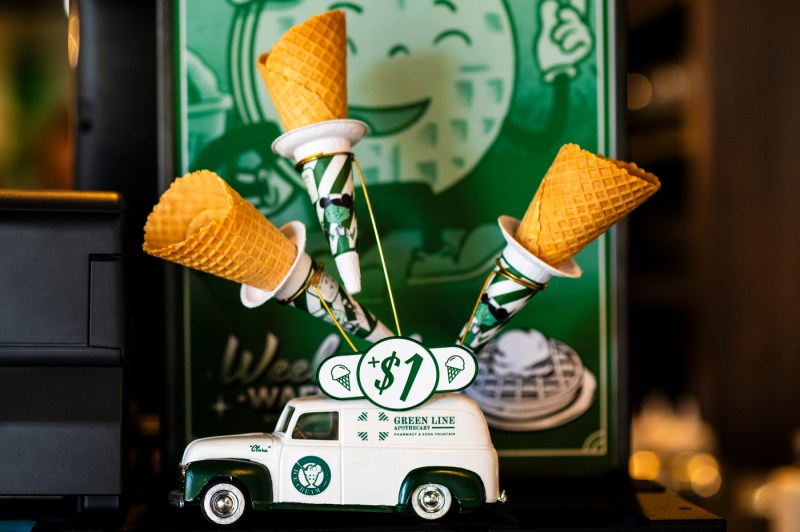
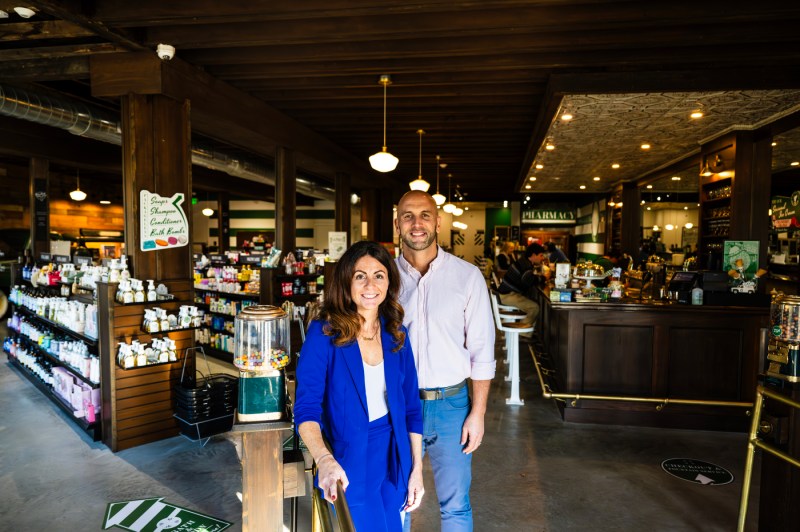
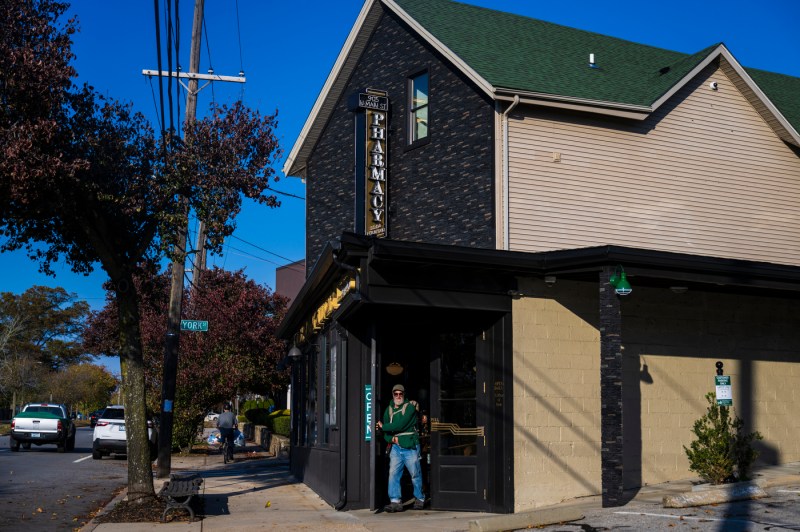
“I can remember always being encouraged,” she says. “It wasn’t a question; you can be an owner. Northeastern had a lot to do with that.”
After earning her PharmD, Christina worked at Mass General Hospital and a Walmart in Lynn, Massachusetts. She also had a job in a simulation lab at the pharmacy school run by Todd Brown, a now-retired professor and the executive director of the Massachusetts Independent Pharmacists’ Association (M.I.P.A.), a business advocacy group for community pharmacies. “She’s very bubbly, very personable,” Brown says. “What probably attracts people to Green Line is her personality.”
When Christina became pregnant in 2009 with the first of three daughters (now 14, 11, and 10), the couple moved from Boston’s North End to Wakefield, where she worked for the pharmacy at McQuade’s, a small grocery chain, for the next seven years.
“We were both happy, doing well in our careers, but this idea of business ownership kept calling to us,” Ken says. “We felt like we could create this modern version of a mom-and-pop drugstore.” They’d fill prescriptions and consult on medications, of course, but by putting in a vintage soda fountain and selling ice cream, they hoped to attract clientele beyond that.
Young, at Northeastern, “was one of the first phone calls I made when we decided to do this,” Christina says. “I said, ‘Hey Anita, I have this crazy idea I wanted to run by you,’ and before I even finished the sentence she was like, ‘Yes! You’re ready. You have all of our support. Who do I need to call; who do I need to introduce you to?’”
They took out bank loans and bought a building. Ken, who had “barely changed a lightbulb” before becoming a business owner, got a contractor’s license, overseeing the construction and using his advertising background to build a brand. Christina did mounds and mounds of paperwork, getting the place certified and working out contracts with pharmacy benefit managers (PBMs), the intermediaries between pharmacies and insurance companies. Their first customer was their next-door neighbor, Bonnie. Now they have thousands.
‘Playing a different game’
What the Procacciantis built in Rhode Island in 2016 was already an endangered species in the early 2000s, when they arrived on Northeastern’s campus as teenagers. In 1980, most Americans still filled medications at independently-owned community pharmacies (the M.I.P.A. defines this as any business that isn’t a publicly-traded company), of which there were about 40,000 across the country, according to industry statistics. By 2000, that number had been cut in half.
Since then, however, that segment of the market has been fairly stable: Depending on the source, there are currently between 20,000 and 22,500 independent pharmacies operating in the United States. That’s because it’s evolved, says Brown. For one, major chains have trouble in areas with very high and very low population density. “You don’t see as many chains in rural areas, because they don’t have the population to be able to support the store.” In big cities, meanwhile, the square footage is too expensive for stores of that size.
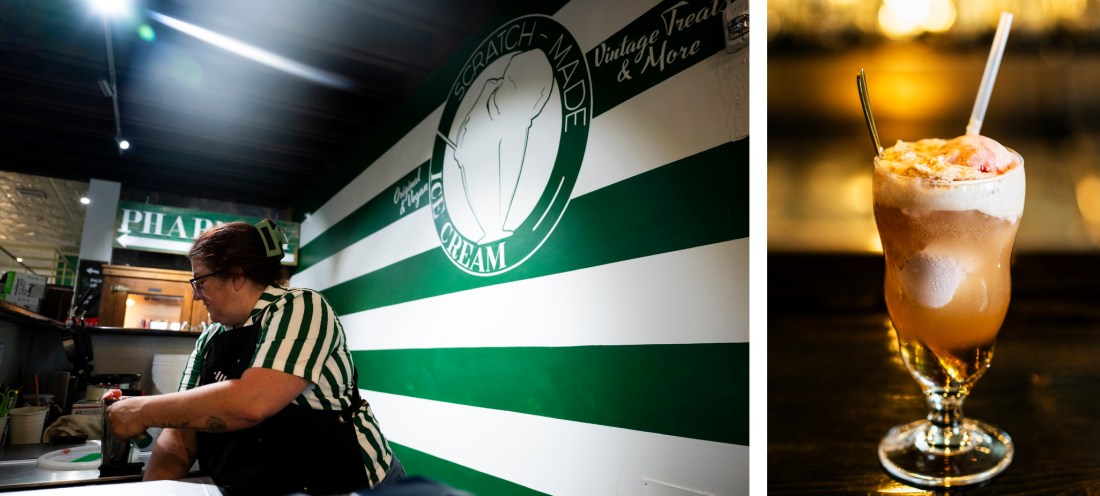
“The chains have a different business model,” adds Brown, who worked at Sullivan’s, a community pharmacy in Boston’s Roslindale neighborhood, before joining Northeastern. “It’s more about convenience than personal interaction; if you’re not on many medications, you might be more likely to select a chain pharmacy.”
But as the sheer number of available medications has grown, and as people live longer, they may have prescriptions coming from three or four different doctors who have no communication with each other. “Other healthcare providers rely on pharmacists to make sure medications don’t interact,” Brown says.
According to Brown, about half of MIPA’s 100 or so member organizations have revamped their businesses to cater primarily to those patients with complex needs. And it’s the fastest-growing segment of Green Line Apothecary’s business. Through Green Line Supply, launched in 2020, staff pharmacists work with patients and their caregivers to streamline their prescriptions — coordinating refills, putting together regularly-delivered packets of daily medicines for customers, and checking in monthly to make sure everything is running smoothly.
“A little old lady will come in with [her] shoebox full of prescriptions, or an adult child trying to figure it out for their aging parent,” Christina says. “We have a generation that’s living longer, and everyone wants to age in place. But medications not being adhered to is often why they end up in an assisted living facility. This has made a difference in people’s lives.”
CVS, she notes, had similar service that shut down in 2023. “There are multiple checks during the process, and we’re able to be nimble and pivot quickly when we need to. It’s something that only an independent can really do well.”
There’s this mentality that you develop as a student at Northeastern that, if I try hard enough, and I care enough, I can make it happen. When we decided to open our own business, we weren’t deterred by the fear of putting ourselves out there.
Ken Procaccianti, co-founder of Green Line Apothecary
Green Line’s future
Green Line Apothecary faces some of the same obstacles that the big chains have in recent years, including hiring qualified staff, working with insurance companies, and competition from online dispensers, including Amazon and Express Scripts. To balance those risks, the Procacciantis have expanded the parts of their business that have nothing to do with medicine. They run a food truck and offer catering services for events and weddings. Recently, they launched their own brand of ice cream, even creating a flavor in partnership with Bananagrams, the Rhode-Island-based company that manufactures the popular, eponymous word game.
“People who come in for ice cream still ask us, ‘can you fill prescriptions there?’” Ken says. “My daughter just met a kid at her high school who had no idea.”
On the medical front, too, they hope their small size will allow them to respond quickly to whatever the larger pharmaceutical industry can throw at them. And whatever the next phase for Green Line Apothecary (a topic they’re mum on, for now), they’ll face it together. The Procacciantis say the twists and turns of being small business owners — from figuring out how to best serve customers through the COVID-19 pandemic, to unlocking the store to serve milkshakes in a blizzard and rustling their pajama-clad kids out of bed to deal with a broken ice cream freezer in the middle of the night — have made their marriage one that’s ready for anything.
“I don’t want to say it’s not hard, but our relationship as husband and wife is better now than it’s ever been,” Christina says.
Schuyler Velasco is a Northeastern Global News Magazine senior writer. Email her at s.velasco@northeastern.edu. Follow her on X/Twitter @Schuyler_V.






